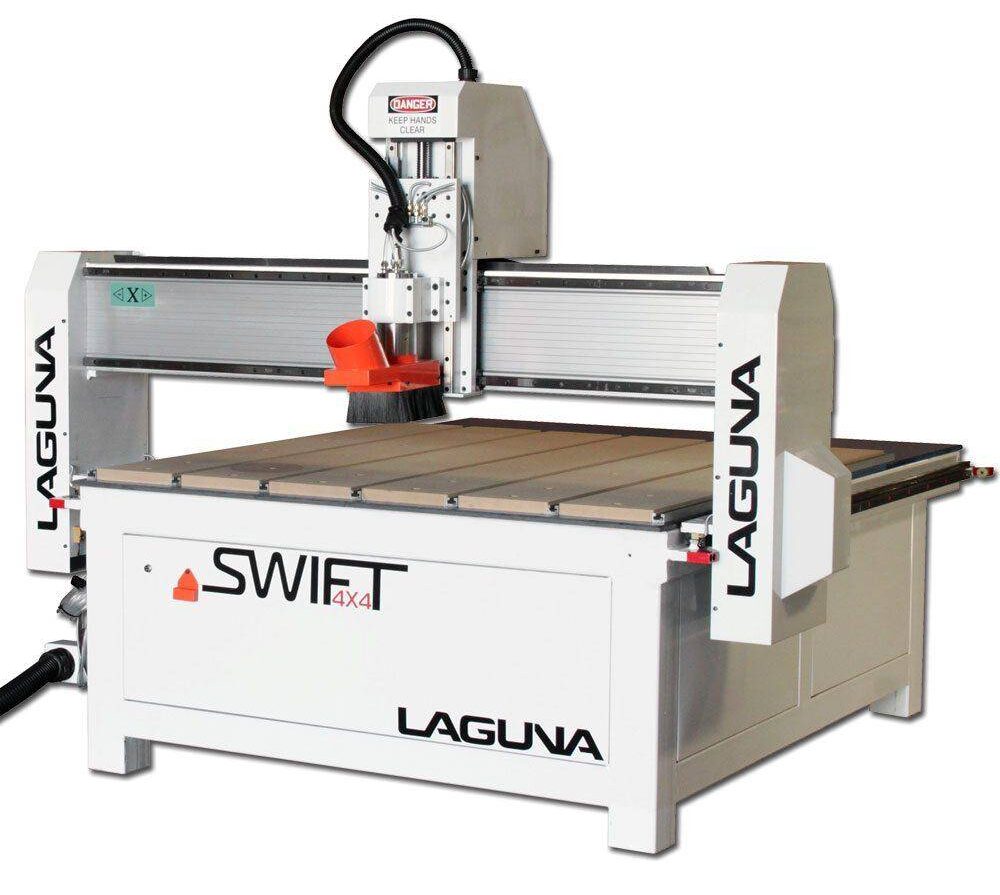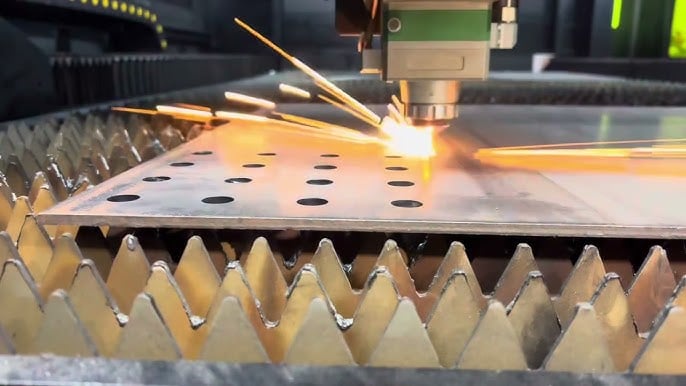The "CNC" in a CNC router is an acronym that stands for Computer Numerical Control. A CNC router has many similarities to a traditional hand-held model.
That means you can use a CNC router for cutting a variety of materials, including foam, plastic, steel, and wood. What helps set a CNC router apart from the rest is that you're using computer software for creating "routes" for the router to make cuts along.
In this guide, we're discussing the sizes available for CNC routers, their uses, if you need a "hobby" CNC router, and using a multi-access CNC router in your woodworking business.
That way, you have the best information in front of you during your purchasing decisions.
What Sizes are Available for CNC Routers?
Older or industrial-strength CNC router models can take up a significant amount of space due to their expansive size.
However, if you choose a newer desktop model, it will fit on a large table. Keep in mind that desktop versions don't feature as much power as industrial models.
However, as soon as you hook them up to your desktop computer, they're ideal for home use.
Users can hook the software up to their home computer and, within minutes, program the CNC router so it will perform a variety of functions.
Here are examples of the available sizes according to their application:
- Metalworking: working areas range between 3.25ft x 4.9ft and 5ft x 10ft. You'll also find table sizes that include 4′ X 4′, 4′ X 8′, 5′ X 10′.
- Sign-Making: Table sizes include 4′ X 4′, 4′ X 8′, 5′ X 10′.
- Woodworking: sizes range from table sizes between 4′ x 4′, 4′ x 8′, 5′ x 10′, and 4′ X 8′, 5′ X 10, 5′ X 12′.
If you're looking for a desktop "hobbyist" CNC router, the most common size you can find them in is 300 x 180 x 45mm. Other sizes include 260 x 260 x 50mm and 406 x 406 x 76mm.
What is a CNC Router Used for?
Initially, a traditional CNC router was designed for performing industrial applications. That's why their original size is significantly larger than a desktop model.
However, throughout the years, these routers have experienced a dramatic reduction in size. Therefore, they can fit on a standard work table without any issues.
No matter if you're in an in-home hobbyist or working in a large-scale corporation, you'll appreciate the versatility of CNC routers.
Here are some uses for this machine:
- 3D Modeling and Prototyping: The success of the production process hinges on precise prototyping and modeling. You need this precision to assess and move on to the next phase of your project. Craft innovative and advanced products by copying, scanning, engineering, and reverse-engineering components using your CNC router.
- Aluminum Machining: Thanks to the increased cutting ability of a CNC router, you can work with non-ferrous metals like aluminum. Determining and utilizing proper spindle RPMs and feed rates become critical when working with aluminum and other non-ferrous materials. The main reason is that, compared to other materials, they interact differently with the blade.
- Cabinetry and Furnishings: CNC routers are used frequently during cabinet and furniture manufacturing. You'll find these applications used for creating standard and customized pieces. When using the 2D, 3D, and 4-Axis capabilities, you'll bring intricate designs to life while delivering an elegant and smooth finish.
- Signage: A CNC router creates everything from small 2D projects to significant 3D signage components. You can use a wide variety of high-quality materials, including acrylic, aluminum, brass, plastic, and more. You can create ADA-compliant signs featuring character spacing, tactile text, braille, and more.
Do I Need a "Hobby" CNC Router?
When deciding if you should pick up a "hobby" CNC router, determine its use. Also, consider if you need the CNC router to handle more substantial projects in the future.
That way, you know for sure if you're starting with the right size CNC router. For example, if you plan to expand beyond being a "hobbyist," then your best bet is choosing a larger model.
Typically, hobby CNC routers are those that are small enough to fit on top of a kitchen counter.
However, you can find larger ones that fit on tables of their own. Depending on the type of work you intend to do on this machine, that will help you determine the right size.
For example, if you like to make models, then a smaller CNC router is fine. However, if you want to make furniture, you'll need a larger one.
Using Multi-Access CNC Routers in Your Woodworking Business
Before completing any jobs for your woodworking business, your CNC router needs two programs. The first program is for creating designs. You'll use the second program for converting those designs into "G-Code" instructions.
When implementing multi-access CNC routers into your woodworking business, you'll find there are many options available:
- 3 axes: cuts occur on an X, Y, and Z-axis. Think about a 3D printer and, instead of using an extruder, the CNC router has a spinning cutting tool that moves extremely fast.
- 4-axis: these CNC routers allow users to work on both sides of a design, which isn't possible on a 3-axis unit. You're still using the X, Y, Z axis, except you're adding another linked axis to make them XYZA, XYZB, or XYZC.
- 5-axis: this CNC router makes additional rotations above the X and Y axes. If you want to use multiple planes while keeping the cutting tool perpendicular to the material's surface, this is highly beneficial.
- 6-axis: optimize speed by adding another rotation axis above the Z-axis. You'll find that, compared to using 3 and 5 axes, the 6-axis CNC router decreases cutting time by approximately 75%.
Final Thoughts
There are a wide variety of applications, cutting options, and sizes available for CNC routers.
Because CNC routers are so versatile and you can use them on a broad range of materials, they're optimal for businesses and hobbyists.
For more information about CNC routers, contact Laguna at (800) 234-1976 or via email at customerservice@lagunatools.com.





